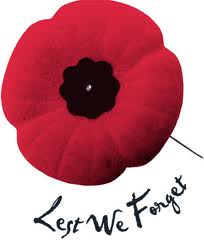Remembrance Day
Terry Sweetman can’t keep ideology out of todays remembrance as he talks of good and bad wars in a piece entitled Remembrance day silence a time to contemplate the pointlessness of-war.
He starts;

We should think of lives lost, lives shattered, lives squandered, and lives given in service of what good men and women rightly or wrongly believed were good and just causes.
and I respond Your article and the above quote makes me think the value of sacrifice of those who served in “bad” wars is less than had they died in “good” wars. You question why we served in earlier wars but the Maori Wars, the Boxer Rebellion, the Sudan War, the Boer War and WW1 were all fought during a period when most people in Australia thought of themselves as British Australians who were similar to British Canadians or British South Africans. It was a case of Britian is at war, we are British, let’s go. Who could argue about the good or bad of WW2. Who would ever suggest we shouldn’t have contributed to the downfall of Hitler and Tojo. No one surely and the arguement that Japan was never really going to invade Australia was lost on my Father as he endured 64 Japanese bombing raids on Darwin. Korea might be officially still under a truce but the communist regimes of China and North Korea didn’t take over the South and it has flourshed so that’s a win. The Paris Peace Talks ended the Vietnam war in a truce as well. All beligerants went home but while the West lost interest and political will the communists never did and North Vietnam, rearmed by the USSR, finally invaded. It took them nearly 15 years to win the hollow invasion and it cost them dearly. We held them up for all that time and sapped their economies so surely that’s a positive. Korea, Malaya and Vietnam were all battles of the Cold War and that was won in 1990 when the Berlin Wall came down. The more recent “good ” and “bad” wars, Iraq and Afghanistan, are battles of the war against terrorism. Both have given the local populace an inkling of democracy, secular education, better health and education outcomes and some hope of a better future. Al Qaeda and theTaliban are somewhat depleted, albeit not destroyed, and I think the point is, the whole affair is a generational campaign that will bear fruit in days to come. The battles aren’t done and the war continues. I’m tired of being told I fought in a “bad” war with 7RAR in Vietnam while the later 7RAR troops who fought in Iraq also copped the “bad” war service but the next rotation to Afghanistan of the battalion served in a “good” war. We don’t see it that way. The country called and we served under the rising sun, as did our fathers, in an apolitical manner. I would rather the line quoted at the start be;We should think of lives shattered and lives given in service of what good men and women believed were good and just causes.
Leave the “rightly or wrongly” and “squandered” to the politicians lest the words start appearing on gravestones and memorials. In the meantime I await the news of my mate Percy who yesterday was given 24 hours to live. Percy served in one of the “bad” wars in an exemplorary manner and in doing so proved himself a better man than Sweetman ever will be.
Re your comments on Japan not invading, they were not capable of invading Australia, nor were they interested in doing so. However that doesn’t suggest that we shouldn’t have fought them. Firstly, by the time we knew they were not planning an invasion (from magic intercepts) we were already at war with them, secondly they attacked our friends and allies, thirdly they attacked us and lastly, given the Japanese culture existing at the time and the atrocity prone nature of the Japanese militaries it was an enormous service to humanity as a whole to assist in defeating them.
Agree – history tells us so but my point was I doubt whether Australian’s generally knew even if GHQ did. The people were worried.
Absolutely correct – The Allies knew the Japs were not coming as of mid April 1942 as noted in the Allied Combined Operations Intelligence Centre minute, 11 Apr 1942, [NAA] MP1587;218s SRs 575 ‘Magic summary’, 18 April 1942, RG257, US National Archives and Records Administration.
However, as you note, the people were worried and they had to stay worried because the Govt couldn’t say “we know the Japs are not coming” as that would have compromised the Magic communications intercepts.
On top of that it would have been a pretty questionable ethical position to say “the Japs aren’t coming for us, so we are going to sit this one out”.